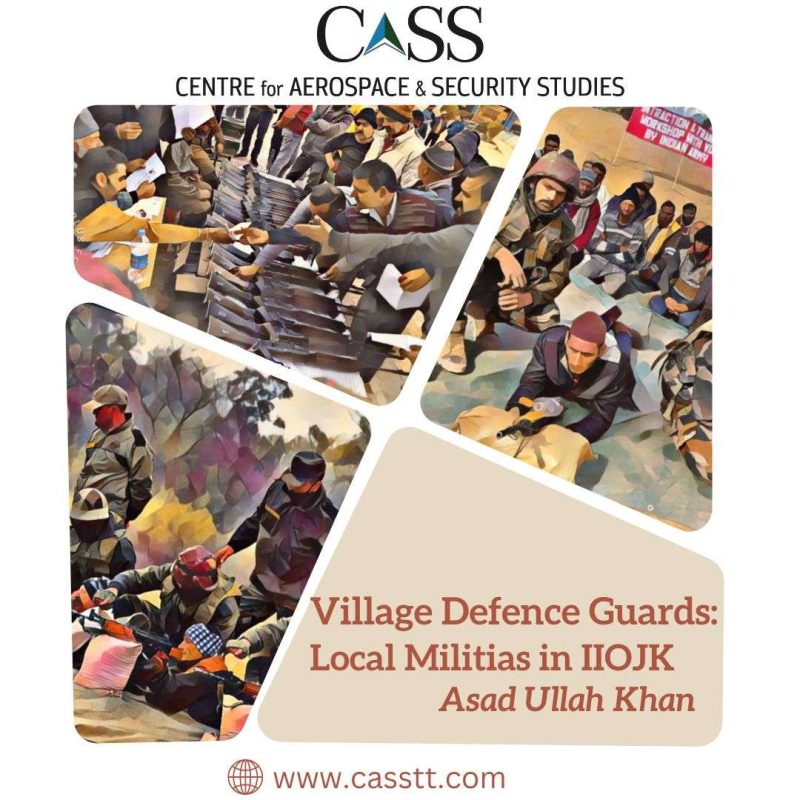The Bhartiya Janata Party (BJP)-led Hindu nationalist government in India has recently taken another step towards the suppression of Muslims in Indian Illegally Occupied Jammu & Kashmir (IIOJK). The Indian government has revived the Village Defence Guards – hereinafter referred to as VDGs. Earlier, the VDGs justified their actions against the Muslim community in the region under the guise of upholding law and order. However, their interventions only exacerbated unrest. Following recent reports of recurring instances of violence, the idea of arming Hindu civilians re-emerged.
The revival of civil militias in the IIOJK has raised serious concerns about the misuse of arms, and human rights violations against the Muslim community in the region. The Indian government defended the move claiming that ‘it will wipe out a decades-old armed rebellion in the disputed region’, but the experience of similar decisions in the past suggests otherwise.
Historically, in many countries across the world, the idea of deploying civil militias has remained in practice. However, such initiatives often resulted in heinous unintended consequences. One pertinent example is the 1994 Rwandan genocide of the Tutsis. The Hutu-led government started calling locals to murder their neighbours and offered rewards. History then witnessed one of the darkest chapters in humanity, where 800,000 lost their lives in just three months. This serves as a reminder of the hazards of relying on state-sponsored militias to maintain law and order.
Coming back to the use of civil militias in occupied Jammu and Kashmir, in the 1990s, when militancy was at its all-time high, the then-Indian government created and nurtured local militias in the Valley for the very first time. With about 4000 members and about 27000 volunteers, the then-named Village Defence Committees (VDCs) were responsible for countering any militancy in the region. Their motives, however, soon changed, and the organisation increasingly started to settle personal vendettas. Members of the VDCs were accused of violence and assault against minorities, and more than 221 official cases were registered against them in different categories like rape, killings and rioting. Despite knowing the consequences of arming civilians in highly sensitive areas, now the current government has again decided to re-arm Hindu villagers.
The VDGs are led by a retired army officer and come under the direct command of the district police leadership. Security officials claim that they will take all necessary measures to ensure that no one abuses the power vested in them through the VDGs. The recruited would be paid about USD 50 per month and undergo a background check before getting recruited.
India has already dug the pits of indignation by abolishing the special status of Kashmir under Articles 370 and 35A of the Indian Constitution. The BJP has stripped Kashmir’s sovereignty with the intention of changing its demographic status from a Muslim majority state to a Muslim minority one. Discriminatory efforts of the Indian government to reduce the representation of Muslims in the legislature and undermine their separate identity have ignited fierce resentment among the people. Hence, this act can be seen as an extension of the Indian government’s efforts to suppress the freedom of Kashmiris and a state-sponsored initiative to continue the atrocities.
Local Muslims see revival of the VDGs as an effort to deliberately escalate state-sponsored violence. Jammu & Kashmir is the world’s most militarised zone, and yet the Indian government is now claiming to be controlling the violence as an excuse to further militarise the region. Deployment of Hindus as the VDGs has given them authority and abusive power over Muslims and has, thus, stirred religious tensions among the people. Convincing Hindus to take up arms would further polarise communities. Fuelling division on the basis of religion would exacerbate the chaotic situation in IIOJK.
Revival of the VDGs has also raised serious questions about the international support that India receives. The country is always projected as a secular state and a strong advocate of democracy, but ironically, the democratic approach it flaunts on all forums remains suspended in the IIOJK. With more than 200 registered FIRs and countless unregistered incidents, humanitarian groups ought to be wary of the ongoing atrocities being endured by the people of Kashmir.
Hence, the revival of VDGs is bound to complicate matters even further. Such an unrealistic and discriminatory approach shows the callousness of the Indian government. The situation will only deteriorate if India, under its Hindutva extremist agenda, prioritises its own interests over the well-being of Kashmiri people and regional peace.
Asad Ullah Khan is a Senior Research Associate at the Centre for Aerospace & Security Studies (CASS), Islamabad, Pakistan. He can be reached at cass.thinkers@casstt.com.
Design Credit: Mysha Dua Salman




